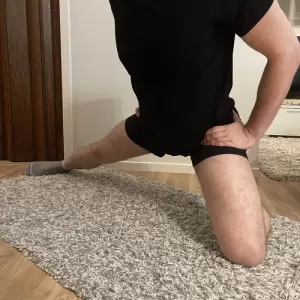Unlock the Power of Your Adductor Longus with These Essential Stretches
As a physical therapist, I have seen firsthand the importance of stretching for maintaining optimal muscle health and functionality.
One muscle that often gets overlooked in stretching routines is the adductor longus muscle, which can lead to decreased hip flexibility and potential pain if not properly stretched.
In this article, I will guide you through the essential adductor longus stretch and explain how this muscle influences both knee and hip functionality.
Best Adductor Longus Stretches
Lateral Lunge Stretch
- From a standing position, perform a side step with one leg, and slowly go into deep lateral lunge stretch.
- Repeat 10x.
One Leg Frog Stretch
- Place your both knees on the ground and extend one leg to the side.
- Slide to the side with your extended leg until you reach the pleasant stretching intensity.
- Hold for 30s.
Wall Adductor Longus Stretch
- Lay down on your back.
- Place your legs on the wall.
- While keeping your legs extended and in contact with a wall, slide your legs to both sides.
- Hold for 30s.
Standing Adductor Longus Stretch
- From a standing position, lift one leg to a box (or something similar).
- Keep your knee extended and hip in external rotation.
- Lean slightly forward with your body.
- Hold for 30s.
Function of Adductor Longus
The Adductor Longus muscle works in conjunction with other adductor muscles to pull the thigh inward towards the midline of the body. This movement is necessary for walking, running, and jumping, as well as other activities that require side-to-side movement.
In addition, the adductor longus muscle helps to stabilize the hip joint, which is important for maintaining proper alignment and preventing injury.
Benefits of Stretching Adductor Longus
Stretching the adductor longus muscle can have a number of benefits beyond improving flexibility and mobility. Here are some additional benefits of stretching the adductor longus muscle:
- Improved Posture: Tight adductor muscles can pull the pelvis forward, causing an anterior pelvic tilt which can lead to poor posture. Stretching the adductor longus muscle can help to improve posture by reducing the tension in the muscle and allowing the pelvis to return to its natural position.
- Reduced Risk of Injury: Tight adductor muscles can contribute to a number of injuries, such as groin strains, hamstring strains, and lower back pain. Stretching the adductor longus muscle can help to reduce the risk of these injuries by improving flexibility, mobility, and muscle function.
- Better Balance and Stability: The adductor longus muscle plays an important role in maintaining balance and stability during physical activities. Stretching this muscle can improve its function and help to prevent falls and other balance-related injuries.
- Reduced Muscle Soreness: Tight adductor muscles can lead to muscle soreness and fatigue, which can hinder performance and lead to injury. Stretching the adductor longus muscle can help to reduce muscle soreness by promoting blood flow to the area and improving muscle recovery.
- Improved Range of Motion: A lack of flexibility in the adductor longus muscle can limit your range of motion, making it difficult to perform certain exercises and activities. Stretching this muscle can help to improve your range of motion, allowing you to move more freely and perform physical activities with greater ease.
Conclusion
Stretching the adductor longus muscle is essential for maintaining optimal muscle health and functionality.
By incorporating the essential stretches outlined in this article into your routine, you can improve flexibility, mobility, and overall performance of the adductor longus muscle while preventing hip injury and discomfort.
Don’t neglect the adductor longus muscle in your stretching routine – your body will thank you for it!


